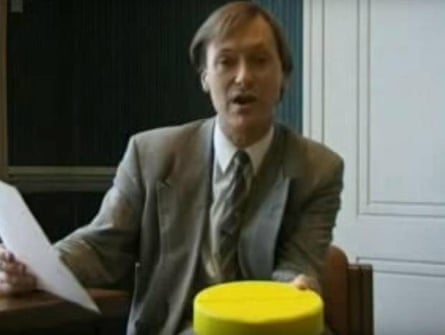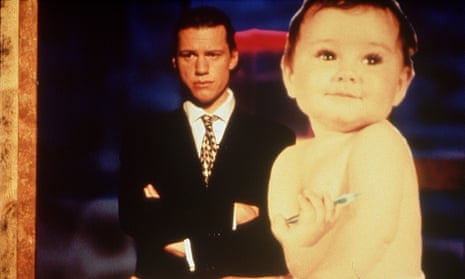As Brass Eye turns 20, it’s worth remembering that it probably shouldn’t have made it to our screens at all. When Chris Morris’s epochal media satire first aired, the broadcasting code forbade programme makers from misleading interviewees for entertainment purposes. Channel 4 defended the show and an amendment informally known as “the Brass Eye clause” was incorporated into the code. It’s an example of Morris’s apparent ability to bend reality according to his needs – and at the time of Brass Eye, he appeared able to perform this trick at will.
It’s hard to overstate the shock of initial exposure to Brass Eye. The Day Today, which aired in 1994, had suggested that Morris was an unusually gifted writer and performer. But this was another level altogether – an artist operating fearlessly at the peak of his powers. From the captions to the graphics, the music to the magnificently mangled language, it seethed with ideas, almost all of them perfectly realised.
The uncannily convincing setting made it hit even harder. Was that really beloved magician Paul Daniels making an appeal on behalf of an elephant that had got its trunk stuck up its own anus? Could that actually be a sitting MP (David Amess) warning about the dangers of a made-up drug called Cake which could make users cry all the water out of their own bodies? Most Brass Eye first-timers alternated between hysteria and gasping, wide-eyed bewilderment.

Brass Eye was a lot to take in. To say it rewarded repeat viewings is an understatement. Arguably more than any other comedy, Brass Eye actively required repeat viewings. These were startlingly odd ideas assembled with surgical precision and complete conviction. Take the Decline episode’s report on drug use at Shaftesbury’s Jams. Filmed in the style of a local news feature, a humdrum meeting about a redesigned jam jar is punctuated by gasps and roars as Matthew, “a new recruit from Spillers dog food”, struggles to moderate his crack cocaine intake. Crucially, it’s played completely straight, and the lack of needy nods to comedy convention somehow makes the sketch both funnier and more disorientating. First, viewers processed the shock of the concept; then, they luxuriated in it.
Brass Eye rewrote the rulebook. And this, of course, encouraged all manner of imitators, from the provocations of Sacha Baron Cohen to the sub rag-week pranksterism of Revolting. But in truth, nothing has come close. This isn’t just down to Morris’s nerve, invention and expertise. He was operating at a cultural and historical sweet spot which may turn out to have been unique. Brass Eye took shape in an era of turbocharged liberalism; after the polarised 80s and before the more culturally sensitive 21st-century took shape and social media arrived, heralding the end of secrecy and the advent of the global lynch mob. Brass Eye wasn’t the only show to take advantage of this singular moment: a glance at somewhat less exalted TV landmarks of its day (The Word, The Girlie Show) confirms that this was an age of risk-taking for risk-taking’s sake. But Morris tested the limits more fearlessly than most. And he did so with greater moral purpose.
Here was a show about ignorance and hypocrisy – about celebrities blindly parroting scripts that 10 minutes of research would have confirmed as ludicrous; about news outlets manipulating and preaching and wallowing in self-orchestrated moral panics. It was devastatingly funny and deadly serious too. But when it returned, in 2001, with the notorious “Paedogeddon” special, it received a taste of a newly emerging reality. Saying the unsayable wasn’t necessarily welcomed any more. Morris was brutalised by the tabloids. Politicians who hadn’t seen the programme still felt able – indeed obliged – to condemn it. In the climate that has subsequently developed, it’s hard to imagine that a future Brass Eye wouldn’t be considered more trouble than it was worth. Which would be a tragedy, because a glance at the current state of media and politics suggests we need the likes of Chris Morris more than ever. After all, what’s the point of having a Brass Eye clause if no one is willing to use it?

Comments (…)
Sign in or create your Guardian account to join the discussion